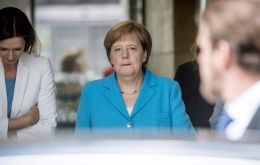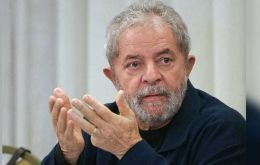MercoPress. South Atlantic News Agency
Stories for July 2nd 2018
-
Monday, July 2nd 2018 - 20:47 UTC
Tension for the Brexit: Theresa May will meet with Angela Merkel and leaders of the EU

The British Prime Minister, Theresa May, will visit Berlin and the Netherlands in the coming days to meet with the German Chancellor Angela Merkel and Dutch authorities before assembling her government to finally decide what commercial relationship her country wants with the European Union (EU) in the future, commented her spokesman on Monday.
-
Monday, July 2nd 2018 - 08:41 UTC
Merkel's coalition on the cliff over differences on migration policy with her Bavarian allies

The resolution to Germany's government crisis proved elusive on Sunday after the head of the Bavaria-only Christian Social Union in Angela Merkel's conservative bloc offered his resignation rather than back down from his stance against the chancellor's migration policies.
-
Monday, July 2nd 2018 - 08:31 UTC
Leading world car makers urge US not to impose tariffs on auto imports

BMW and Hyundai Motor urged the U.S. not to impose tariffs on auto imports, joining General Motors Co. in pressing their case to the Commerce Department even as a top aide to President Donald Trump dismissed the concerns as “smoke and mirrors.”
-
Monday, July 2nd 2018 - 08:25 UTC
Saudi Arabia prepared to help with Trump's request “to pump more oil”, but gives no specifics

President Donald Trump said over the weekend that he had received assurances from King Salman of Saudi Arabia that the kingdom will increase oil production, “maybe up to 2,000,000 barrels” in response to turmoil in Iran and Venezuela. Saudi Arabia acknowledged the call took place, but mentioned no production targets.
-
Monday, July 2nd 2018 - 08:17 UTC
Canadian retaliatory tariffs of US$ 12.6bn on US goods became effective

Canada began imposing tariffs Sunday on US$12.6 billion in U.S. goods as retaliation for the Trump administration's new taxes on steel and aluminum imported to the United States. Some U.S. products, mostly steel and iron, face 25% tariffs, the same penalty the United States slapped on imported steel at the end of May.
-
Monday, July 2nd 2018 - 07:28 UTC
Landslide win for México's Lopez Obrador who pledged battle the 'mafia of power'; Trump congratulates

Andrés Manuel Lopez Obrador, who rallied voters with his battle cry against corruption and promises to the poor, won a resounding victory Sunday night in Mexico’s presidential election, after the concession of his two top rivals. The victory makes him the first left-oriented president since Mexico began its transition to democracy more than 30 years ago.
-
Monday, July 2nd 2018 - 07:27 UTC
Lula's latest appeal will be referred by the full Supreme Court in August

Brazil's Supreme Court (STF) Justice Edson Fachin has referred the appeal filed by the former president Lula da Silva's defense team to the full court. The ruling is expected for August, after the recess of the Brazilian judiciary.
-
Monday, July 2nd 2018 - 07:03 UTC
EU university students in UK will have same treatment as home students in post Brexit

European Union students at universities in England will continue to be treated the same as home students in the first intake after Brexit. UK Education Secretary Damian Hinds says EU students starting in autumn 2019 will pay the same tuition fees as English ones and their access to support will be unchanged.
